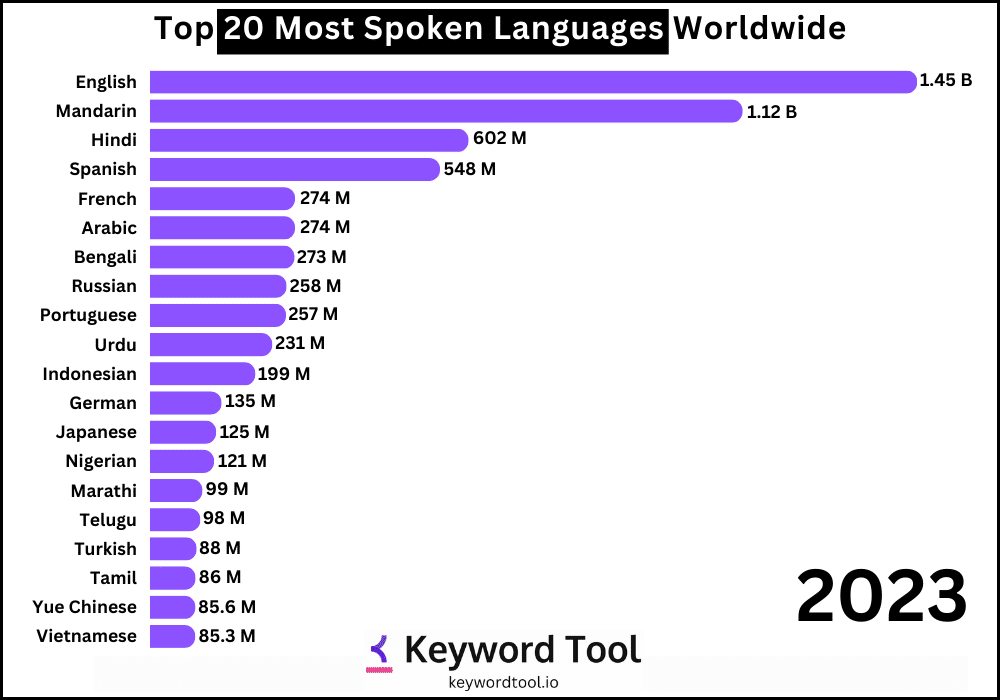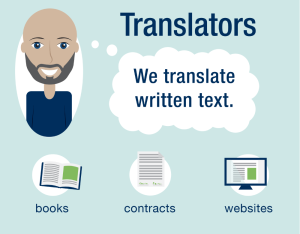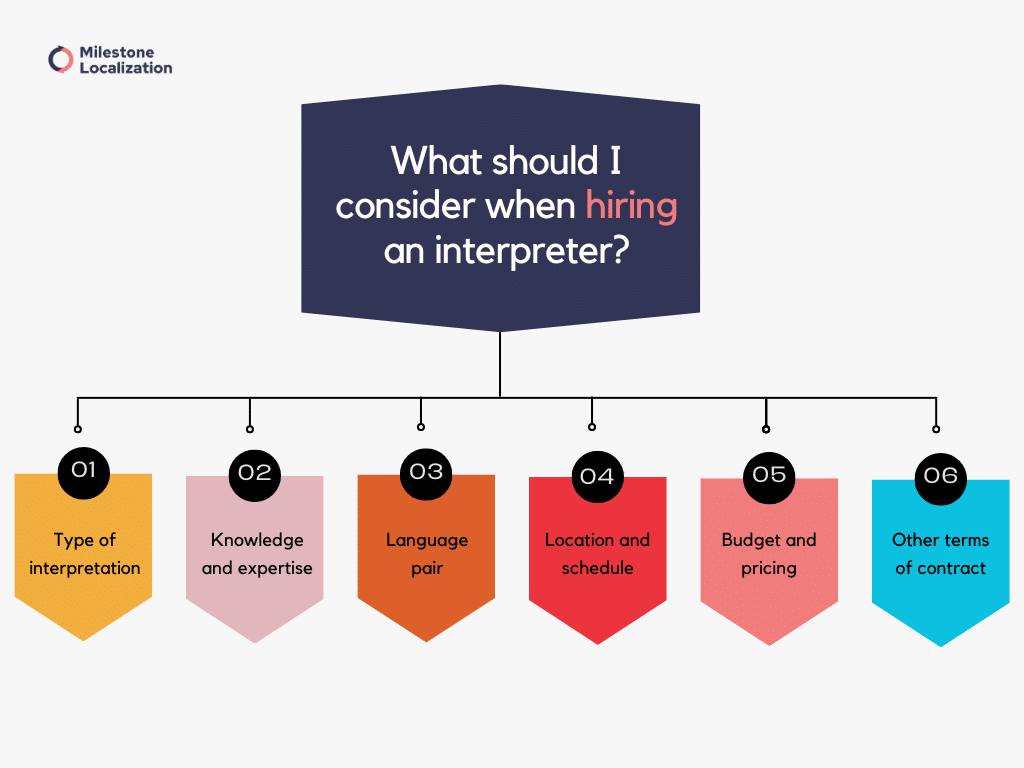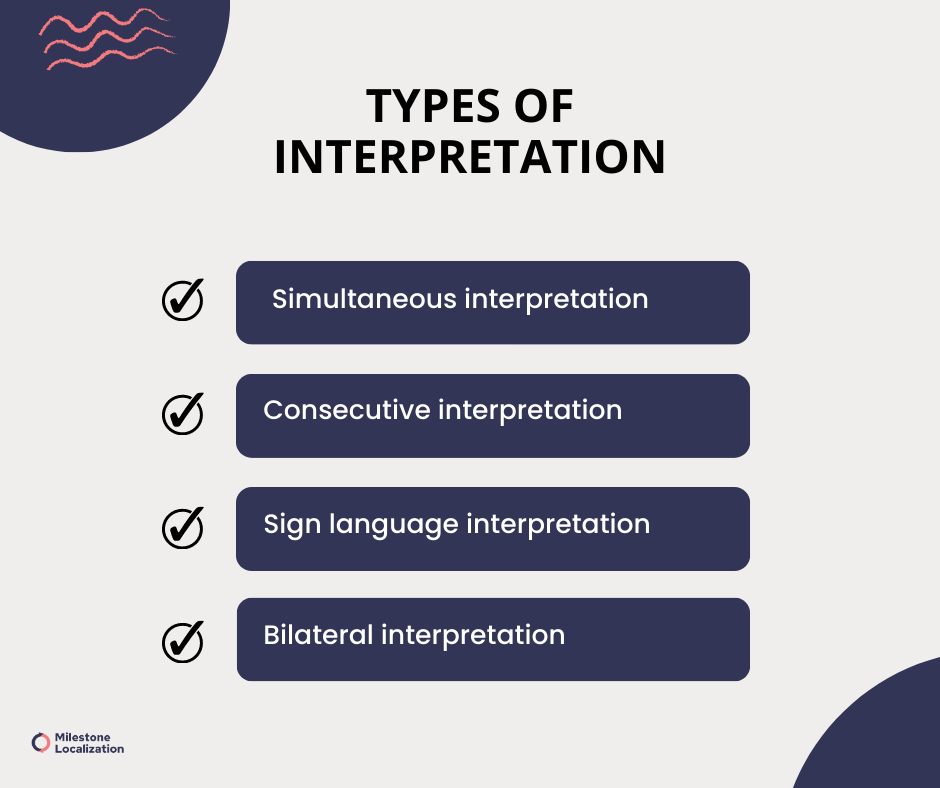We live in a globalized world in which we openly embrace and celebrate cultural and linguistic diversity in all spheres of life, such as education, pop culture, business, etc.
Thus, organizations and companies strive to accommodate their employees, partners, and customers by adapting their content or products to the linguistic and cultural backgrounds of all parties involved.
As a result, English is no longer the primary language in professional and informal environments.

Also read: ICF Translation: Importance, Requirements & Best Practices
People from various linguistic backgrounds expect representation and the opportunity to speak freely in the language they feel most comfortable in.
Hence, interpretation has gained enormous importance in all kinds of settings.
Interpretation, similarly to translation and localization services, aims to enable straightforward communication beyond linguistic barriers.
What’s more, it can foster diversity and inclusivity by allowing communication in both spoken and sign language.
This language service will undoubtedly remain important to communication in the upcoming years since it simplifies communication and encourages linguistic, cultural, ethnic, religious, etc. diversity.
However, finding the right interpreter for your needs is crucial for a successful interpretation. This task, unfortunately, might not be as easy as it might seem.
But there’s no need to worry!
In the following blog, we offer you a comprehensive guide to the types of interpretation, modes of interpretation, as well as a few tips on how to choose the right interpreter.
Are you looking for a professional interpreter?
We provide in-person interpretation, over the phone and remote interpretation services for all major languages.
What is interpretation?
Interpreting is the oral transfer of a piece of spoken text from one language into another.
In this regard, it is very different from translation, which focuses on the transfer of written content from a source into a target language.
Interpretation can be done using either spoken or sign language.
In addition, interpreting can be seen as a paraphrasing of spoken content. The most important task of an interpreter is to translate the message of one speaker into another language.
Due to the immediate nature of the interpreting process, word-for-word translation is virtually impossible. Instead, interpreters focus on delivering the meaning of the spoken context.


Also read: Top 6 Languages For Your Business
Types of interpretation
Simultaneous interpretation
In simultaneous interpretation, the delivery of the translated message happens in real-time, at the time of speaking.
This is a very challenging type of interpretation, as the interpreter must simultaneously listen to the speaker(s), comprehend the content, and deliver it in another language right away.
Simultaneous interpretation is usually used in large-scale conferences or meetings. Interpreters are usually situated in so-called interpreting booths, where they have a view of the whole room, wear headsets, and speak into a microphone.

What’s more, due to the high intensity and heavy mental load of this type of translation, interpreters work in pairs and take turns at intervals of 20-30 minutes.
Consecutive interpretation
Consecutive interpretation is a type of interpretation whereby the interpreter has to wait for the speaker to finish their speech before proceeding with the delivery of the statement in the target language.
Due to the rather long duration of the speaker’s statement, the interpreters take notes to remember the key points, which then help them deliver a more detailed interpretation.

Consecutive interpretation is commonly utilized in diplomatic visits and official statements.
Also read: Business In Japan: Cultural Differences You Need To Know
Sign language interpretation
Sign language interpretation is a type of interpretation that enables individuals who are hard of hearing or deaf to participate actively in various settings in education, medicine, social life, and law.

Sign language interpreters can translate both written and spoken language into visual communication using facial expressions and gestures.
Besides language proficiency, sign language interpreters are required to have cultural sensitivity and an understanding of the needs of deaf individuals.
It is important to mention that sign languages are associated with specific countries or regions. In other words, knowing one sign language does not mean one can understand another.
However, a text-to-speech app enhances accessibility by providing real-time translations, creating a more inclusive environment.
Bilateral interpretation
Bilateral interpretation is similar to consecutive interpretation; however, in that case, there are two parties involved who don’t speak the same language. Thus, the interpreter relays the statement once the speaker has finished speaking.
In bilateral interpretation, the interpreter is constantly switching between the languages of each person to accommodate the communication.
Situations in which bilateral interpretation is used include business meetings, negotiations, police interviews, doctor appointments, or court hearings.
Also read: Business In The Middle East: Cultural Differences You Need To Know
Modes of interpretation

In-person interpretation
In-person interpretation, as its name suggests, takes place in an environment in which the interpreter is physically present.
As already mentioned, if an event has a prolonged duration, interpreters work in pairs, alternating every 20-30 minutes.
Most conference rooms are equipped with interpreting booths. In these, interpreters use microphones, headsets, and an interpreting console to control the interpretation process. Attendees, in turn, can listen to the interpretation via headphones.
With smaller-scale meetings, the interpreter sits next to the clients and speaks with them face-to-face.

Also read: Doing Business In China: Cultural Differences You Need To Know
Over-the-phone interpretation
Over-the-phone interpretation is another mode of interpretation that allows two or more people who don’t speak the same language to communicate by using an interpreter over the phone.

In this kind of interpreting, the interpreter lets one party speak and then relays their statement in the other party’s language. When the interpreter is done, the other party responds, and the same process is repeated over and over again.
Over-the-phone interpretation allows interpreters who are not available on-site or clients at two separate locations to communicate.
Remote interpretation
In the case of remote interpretation, the interpreter is not available on-site.
Again, this mode of interpretation aims to allow two parties who do not speak the same language to communicate, even though an interpreter is not available on-site.
Depending on the systems used, there are two types of remote interpretation:
- Video Remote Interpretation (VRI): VRI is typically done via a web camera or videophone system. This mode of interpretation allows for sign language interpretation as well.
- Remote simultaneous interpretation (RSI): RSI has been available since 2014 when Interprefy launched its first-ever remote simultaneous interpretation platform.
In this mode, interpreters can work from anywhere as long as they have a laptop and a stable internet connection. They log into an interpreting console on the cloud and can do the same work as in an interpreting booth.

Are You Looking For A Professional Interpreter?
We provide in-person interpretation, over the phone and remote interpretation services for all major languages.
What should I consider when hiring an interpreter?
Before hiring an interpreter, you need to consider some factors that play an essential role in determining your choice:

Type of interpretation
When deciding what type of interpretation to choose, you need to take into consideration the parties involved.
For example, if there are deaf or hard-of-hearing participants, a sign-language interpreter is a must.
Your audience or/ and participants are the most important factor when choosing a type of interpretation. Remember that the right type of interpretation should allow for smooth communication.
Knowledge and expertise
Another very important factor in hiring an interpreter is their knowledge and expertise.
For instance, hiring a legal or medical interpreter for a business meeting between the board members of an international tech company is an absolute no-go.
Depending on their domain and the mode of interpretation, interpreters have specific knowledge and expertise.
For example, interpreters who do remote simultaneous interpretation have gone through the appropriate training to fulfil the requirements of their job.
Also read: Top Qualities Of A Good Translation
Language pair
The choice of language pair depends on the parties involved and the languages they can or cannot speak.
Consider the type of people at your event/ meeting to decide on the language of the interpreter.
Location and schedule
Location and schedule are decisive when it comes to the mode of interpretation and, thus, should be clarified as soon as possible.
For example, if all participants as well as the interpreter can be on-site at the same time, you can opt for in-person interpretation.
If one participant or the interpreter themselves cannot attend in person, you have two options: over-the-phone or remote interpretation.
Checking on everyone’s availability for a given time and location as early as possible guarantees that you choose the most suitable mode of interpretation.
Budget and pricing
Arguably the most important factor when hiring a professional is your budget.
Depending on the type and mode of interpretation, together with the duration of the gig, language pairs, etc., the prices can vary considerably.
For example, languages such as Chinese, Japanese, and Arabic are more expensive. Interestingly, these languages are not rare, and there are quite a few interpreters out there.
However, they are very challenging due to complex grammar and subtle nuances in meaning in comparison to English, which leads to higher prices for language services.
Nevertheless, keep in mind that deciding on a budget from the very beginning can be extremely beneficial in finding the best interpreter for your needs.
Also read: Reduce Localization Costs: 6 Simple Tried And Tested Ways
Other terms of the contract
Last but not least, make sure you think through other aspects of the interpreter’s job, such as confidentiality, duration of the event, accommodation in case they need to travel to the location of the event, etc.
For instance, clients often overlook confidentiality issues related to the information exchanged between the parties. In such cases, signing a confidentiality agreement beforehand would be a necessity and, thus, should be included in the contract.
How can a Language Service Provider Help?
Looking for the right interpreter on your own can be quite time-consuming and, especially when one is inexperienced, can be frustrating.
In that regard, working with a reliable language service provider can be a game-changer.
A good language service provider has a team of interpreters who are well-trained and experienced native speakers. In addition, a language service provider can offer a wide range of languages, from which you can freely choose.
What’s more, a language service provider can be immensely helpful in deciding the type and mode of interpretation that are most suitable for your needs.
Depending on your requirements, the language service provider would select the perfect candidates for your event.
Then you would have the chance to speak personally to each interpreter, discussing the requirements of the job as well as the content.
As a last step, you can select the best candidate for your needs.
A reliable language service provider will guide you through every step, making sure that the whole process, from the beginning until the very end, runs smoothly.
Also read: Translation Agency vs Freelancers: Who Is Better For Your Business?
Conclusion
Interpretation has become more than a tool for straightforward communication across language barriers. Indeed, interpretation services can foster intercultural understanding as well as accessibility for hard-of-hearing or deaf people.
Nevertheless, finding the right interpreter for your needs can be an overwhelming process. Thus, it is always advisable to look for a reliable language service provider who can assist you from the very beginning.
Are You Looking For A Professional Interpreter?
We provide in-person interpretation, over the phone and remote interpretation services for all major languages.





